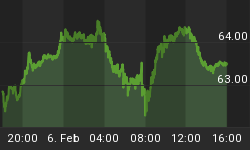08:40 EST, Thurs 21 May
Gold Rises Again as UK Faces Credit Downgrade, US Treasury Refuses to Discuss Banking Exit Plan
THE PRICE OF GOLD in the wholesale spot market rose to new 7-week highs at the start of London dealing on Thursday, touching $944 an ounce before slipping back as the US Dollar bounced on the currency market, and crude oil fell together with world stock markets.
Sony Corp., the Japanese electronics giant, said it will halve the number of suppliers it uses, knocking 20% off last year's $5.3 billion purchasing costs.
Here in London, the UK government's credit status was cut from "stable" to "negative" by ratings agency Standard & Poor's, one month since the finance ministry announced a deficit worth 12% of the country's annual economy.
"The trend is your friend, so while we continue to achieve higher highs and higher lows [in Gold Prices], our bias will remain bullish," says the latest technical analysis from precious metals dealer Scotia Mocatta.
"Our target is 966 but see resistance at 948 ahead of that level from a well-defined channel drawn off of 866 and 880."
"Many factors are moving in sync for a higher Gold Price," agrees Walter de Wet at Standard Bank, pegging technical support at $926 and resistance at $944 an ounce.
World equities fell nearly 1% by lunchtime in London on Thursday, with the UK's top 100 shares unwinding the last two weeks of gains.
An early drop in the British Pound - sparked by S&P changing the UK government's credit status - failed to boost Gold Prices in Sterling however, leaving them unchanged across the last two sessions near £600 an ounce.
For Eurozone investors now Ready to Buy Gold, the price ticked lower from a 3-day high at €685.
"Didn't [Standard & Poor's] see the UK budget when it came out? They are a bit late, aren't they?" asks Ian Williams, CEO of London's Charteris, managers of the best-performing gilt fund so far in 2009.
The threat of an S&P downgrade "won't change the way I invest," Williams told Bloomberg earlier. "I don't think in the real world it will affect the ability of the UK government to pay coupons on gilts.
"Unlike the Eurozone, they can print money."
Earlier this month the Bank of England extended its Quantitative Easing program by two-thirds to £125 billion ($193bn) - growing its purchases of government debt in a bid to inject money into the financial system.
Comparing today's US, Swiss, Japanese and UK 'money printing' with the hyper-inflation of 1920s Germany, the Bank of England was already set to buy "£300 billion per annum, 65% of British government spending," as Martin Hutchinson has noted at Money Morning.
"Thus, while the United States is approaching and further overtaking Weimar German policy (50% of government spending), Britain has already overtaken it!"
Today saw longer-dated UK bond prices fall on the S&P announcement, pushing the 30-year yield up above 4.5%. But shorter-term government debt rose after an auction of five-year gilts drew bids for 2.6 times the record £5 billion on offer.
New data from the Bank of England meantime showed private-bank lending contracting in the UK in April, down by almost £11.9 billion ($18.4bn).
"Things have unquestionably improved," says Alan Greenspan, former Fed chief, in a new interview with Bloomberg.
"They've improved everywhere in the world. It's remarkable."
Yesterday the Federal Reserve released minutes from its latest policy meeting that said the US economy will likely contract by 1.3% to 2.0% in 2009, rather than the 0.5% predicted before.
Unemployment is set to approach 10%, the Fed minutes say.
Today the Wall Street Journal reports that the US Treasury is lending an extra $7 billion to GMAC, calling it "a step towards" the auto-financier a quasi-government body.
GMAC has already borrowed $5 billion from the Troubled Asset Relief Program (TARP) in exchange for five million shares in the company.
"Crises this severe don't burn themselves out. To fix them requires the action of government," said US Treasury secretary Tim Geithner to the Senate Banking Committee on Wednesday.
Asked when and how the government will withdraw the huge volume of credit it's extended to private borrowers, "I'm not prepared to talk to that today," said Geithner.
"We're not quite there yet."















